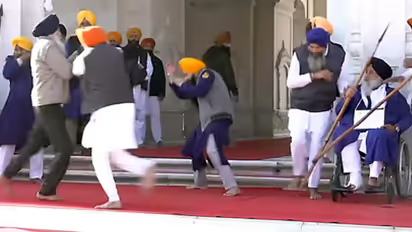What does 'Tankhaiya' mean? Explaining the Sikh guilty verdict for code violations

Synopsis
Former Punjab Deputy CM Sukhbir Singh Badal was shot at while performing sewa at the Golden Temple in Amritsar. The suspect, identified as Narayan Singh Chaura, is in custody. This incident occurred a day after Badal accepted a religious penalty for past actions during his time in office.
Sukhbir Singh Badal, a former Punjab Deputy Chief Minister and leader of the Shiromani Akali Dal (SAD), was was carrying out the role of a "sewadar," or volunteer, on Wednesday morning at Amritsar's Golden Temple when a man opened fire on him. The suspect has been taken into custody and is being questioned by police. Narayan Singh Chaura, a former member of Babbar Khalsa International (BKI), one of the oldest Khalistani separatist organizations, has been named as the suspect.
A day before, the Sikh clergy administered the "tankhah," or religious penalty, announced their decision. Serving his sentence at the Golden Temple's entrance in his wheelchair, Badal was wearing a blue 'sewadar' outfit and holding a spear in one hand. His leg is fractured.
Badal and other leaders received a "tankhah" (religious penalty) from the Sikh clergy for "mistakes" made by the SAD and its government in Punjab from 2007 to 2017. Before the sentence was announced, Badal acknowledged a number of errors, including forgiving Gurmeet Ram Rahim Singh, the leader of the Dera Sacha Sauda, while the SAD government was in power in Punjab.
Badal stepped down after being found guilty of mistakes, including the failure to punish those responsible for the 2015 sacrilege incidents and pardoning Gurmeet Ram Rahim Singh in a 2007 blasphemy case. Along with Badal, many other key Sikh leaders from his government were also labeled as 'Tankhaiya.'
Here's a look at what 'Tankhaiya' means:
"Tankhaiya" refers to a penalty or conviction for religious transgressions by the highest religious authority. The Jathedar of the Akal Takht has the authority to proclaim a Sikh "tankhaiya" if they violate the Sikh rehat maryada (code of conduct) or engage in activities that are hostile to the Sikh community. The individual is then required to publicly apologize for their acts in front of the Sikh community at the Akal Takht. The Jathedar then determines the proper penalty after consulting with the Five High Priests.
Stay updated with the Breaking News Today and Latest News from across India and around the world. Get real-time updates, in-depth analysis, and comprehensive coverage of India News, World News, Indian Defence News, Kerala News, and Karnataka News. From politics to current affairs, follow every major story as it unfolds. Get real-time updates from IMD on major cities weather forecasts, including Rain alerts, Cyclone warnings, and temperature trends. Download the Asianet News Official App from the Android Play Store and iPhone App Store for accurate and timely news updates anytime, anywhere.